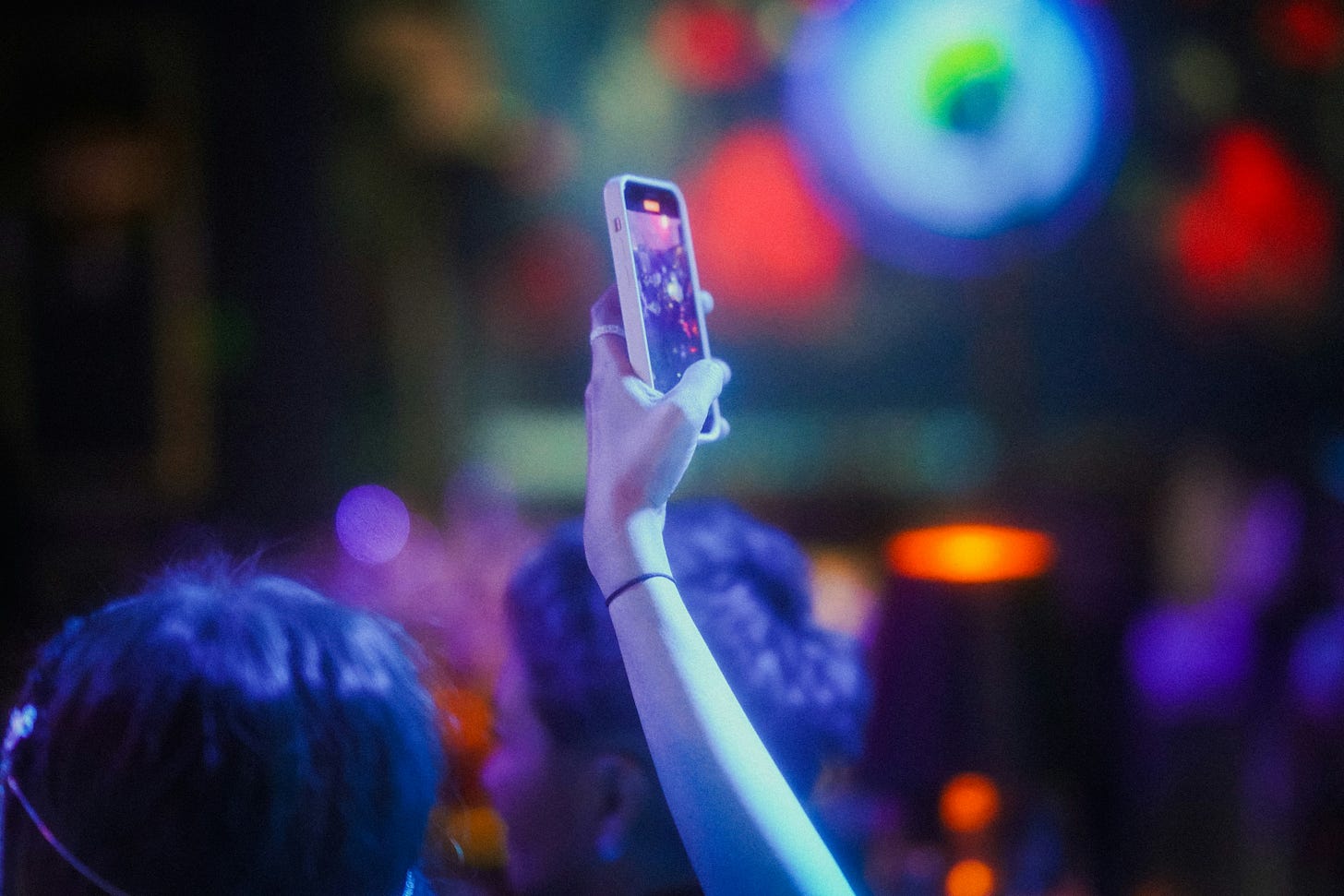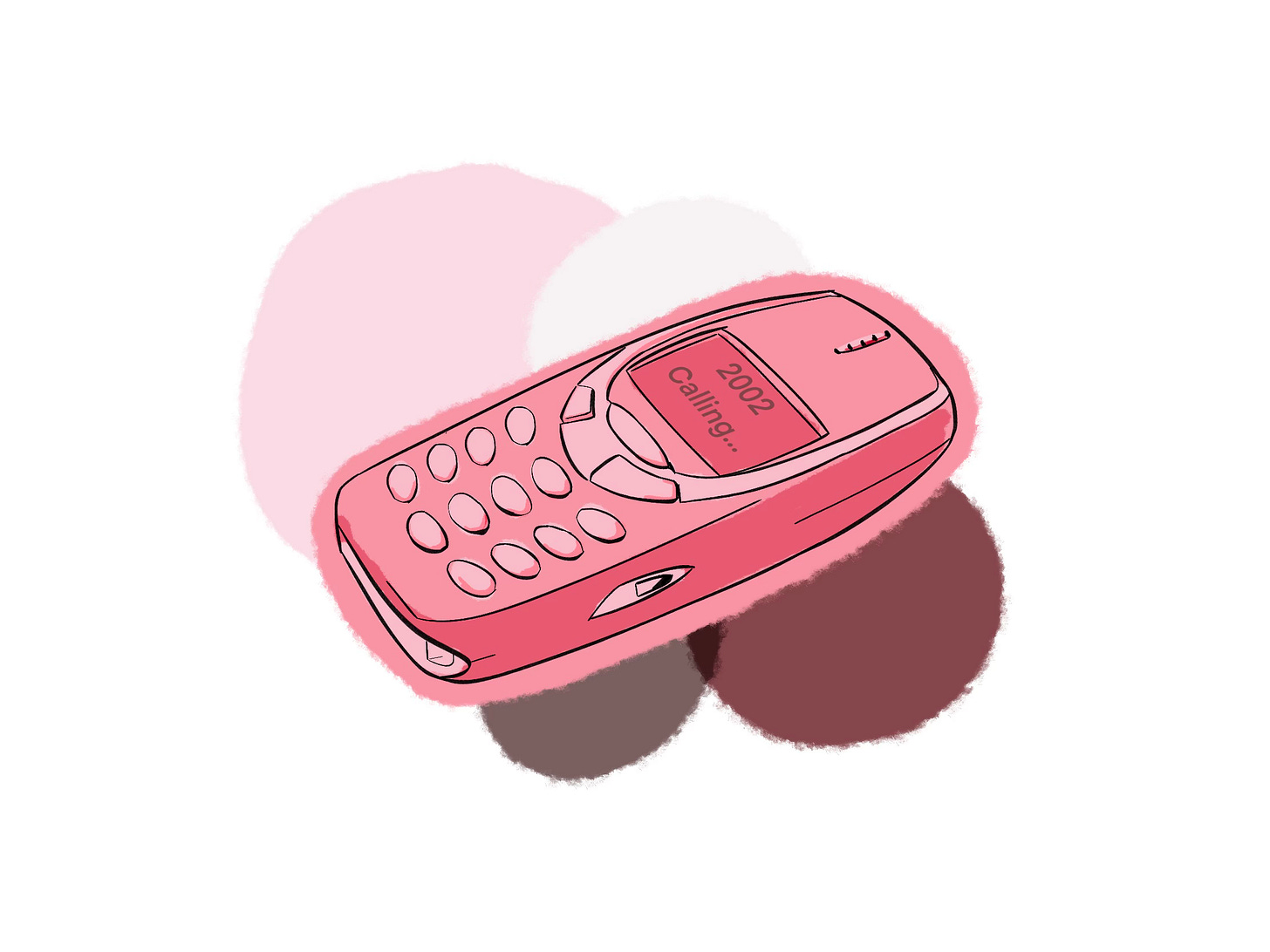On our complex relationship with documenting memories and living in the moment
I promise this isn’t all doom and gloom…
With the newest smartphones constantly at our fingertips, many of us prioritise capturing our memories through a lens before really living them. When the World Wide Web was only in its early days and technological distractions were minimal, people – aka our parents – were much better at being present. But in a world of modern tech and social media, is our generation still capable of living in the moment?

When Guardian journalist Esther Addley contacted me a few weeks ago asking to interview me for a piece about nostalgia and the 90s after stumbling upon this blog, I happily agreed. Esther was keen to chat to somebody in their twenties about younger generations’ nostalgia for the 90s, which appears to have manifested in fashion trends, music tastes, and a rise in retro tech like disposable cameras and clunky camcorders.
 Tiktok failed to load.
Tiktok failed to load.Enable 3rd party cookies or use another browser
To an extent, fashion and beauty trends always tend to come back around, as is their cyclical nature, but perhaps 90s and Y2K aesthetics having a moment is a result of young people’s inexplicable yearning for these decades. Personally, I feel nostalgic for the 90s, even though I wasn’t there. Well, I was, but only for the final four months…
As I told Esther, I love hearing my parents and their friends talk about carefree summers of Greek Island hopping (it’s giving Mamma Mia!) and interrailing Europe, the clubbing and pub culture of the 90s, and the gigs. They tell me you would actually have to phone up the venues to secure concert tickets. Forget the modern-day perils of Ticketmaster and dynamic pricing.
Although I can’t speak for my whole generation, there seems to be a similar sentiment among my peers that the 90s just seemed more fun. I’m not saying we don’t see things through rose-tinted glasses (the grass is always greener, right?), and many things have changed for the better, but life just seemed a bit simpler. I imagine the lack of social media certainly played a part.
Not to mention how much better nightlife and partying was in the era of super-clubs, raving, and peak pub culture. The Great Clubbing Decline – accelerated by the pandemic – has left my generation with meagre options for a good old Night Out. In 2005, the UK had 3,144 clubs, decreasing to 1,733 in 2015, according to The Association of Licensed Multiple Retailers. By June 2024, there were just 787, according to the analysts CGA by NIQ and AlixPartners.
Esther and I had a really interesting chat for her piece, which is excellent (you can read it here). But as is the way with such articles, there’s only ever room for a few quotes and our conversation left me with a lot of things to think about, so I thought I might pen some additional reflections here, namely about phones, social media, and our seeming (in)ability to be present.
A rise in retro tech
One of the ways younger generations’ nostalgia has manifested is through a rise in retro tech – think disposable and film cameras, polaroids, and flip phones, to name a few. Like this TikToker, even I remember picking up a disposable camera for less than a tenner – now you’re looking at £20+.
A digitally archived 2002 Argos catalogue informed me that in the early 2000s, you could treat yourself to a film camera for just £9.99 and purchase five (!) single-use cameras for under £20.
I think as long as we have a smartphone available to us, it’s hard to resist the temptation of capturing or recording something ‘for the memory’, whether that’s a personal moment with friends or a band playing your favourite song live. It’s almost like if we didn’t record it, we were never there. But surely it means we aren’t letting ourselves truly live in the moment – that we’re sacrificing it to have the memory available to us at a later date.
Ironically, despite not having smartphones, I think our parents’ generation was better at documenting memories. How often do you actually watch back all those videos you took? But I find that older generations usually have a surplus of physical photo albums available to flick through and get nostalgic about on a lazy Sunday afternoon over coffee.
A while ago, I did an experiment for a feature I was writing, where I swapped my iPhone for a Nokia Brick for seven days. I can wholeheartedly say it improved my social connection and ability to be present. Heck, I was calling my boyfriend on our relic of a landline phone (does anyone else still have one of those?) to chat. When I was out with friends, I was more engaged with the moment – forced to keep my eyes up because I had no screen to default to. In the end, though, the device wasn't exactly compatible with my work or social life, and it became difficult to stay in the loop. Regrettably, my little pink Nokia is now gathering dust on a shelf somewhere.
Feeling like you have to be constantly reachable
In a modern world with so much technology at our disposal, it’s as if we have a responsibility to be constantly reachable. We can’t switch our phones off because what if something bad happens and someone needs us? But as long as our phones are switched on, although we’re reachable, we’re also very easily distracted.
When my mum and her mates went interrailing in their late teens/early twenties, they didn’t have mobile phones. Instead, they would send postcards to assure their families they were alive (I know, pretty much the equivalent of Carrier Pigeons to our generation). If they felt particularly generous and had the cash to spare, they would ring one mum from a telephone box to relay the message they were safe to the rest of the parents. Now, if I were to not text my mum for 24 hours while off on some adventure, she would undoubtedly be sounding the alarm.
Embracing basic tech
It's not that I think technology is inherently evil. After all, it has improved so many things and saved countless lives. But I want to work on embracing basic tech more when I can. I’m going to Glastonbury for the first time this year, and I only want to use my phone for practical things like directions and schedules. I will fork out the 20 quid for a Boots disposable camera and hope it captures some moments to reminisce on with my Grandkids in the future.
But mainly, I will try my best to truly take in every moment as it comes, just as my mum did in her twenties. And I challenge you to do the same: when and where you can, try to keep your phone out of reach and look up and out at the world. It can be a beautiful place sometimes.








